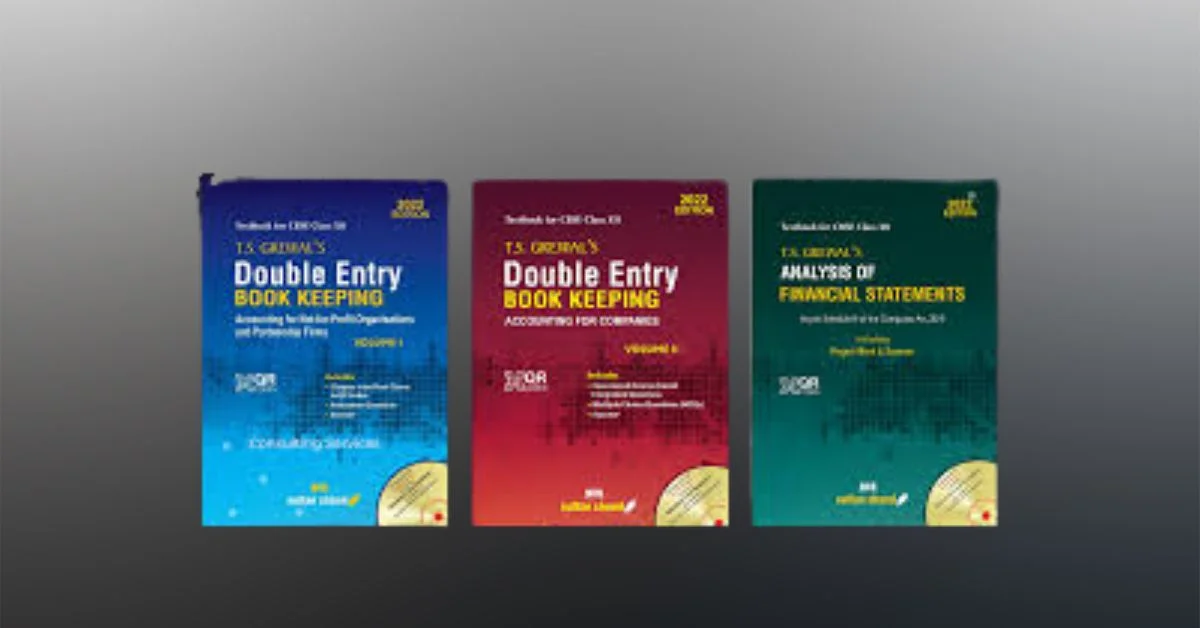In the academic journey of a commerce student in India, Class 12 Accountancy plays a pivotal role. It is not only one of the core subjects for CBSE students but also foundational for those planning to pursue careers in finance, management, business, and economics. Among the many textbooks available, TS Grewal’s Accountancy book is widely regarded as the gold standard for its clarity, comprehensiveness, and examination alignment.
If you searched for “Class 12 Accounts TS Grewal Solutions,” you are likely looking for concept-based explanations, detailed numerical solutions, and reliable help for your board exam preparation. This article is an in-depth guide crafted specifically for your needs—whether you’re a student, teacher, or parent trying to understand what makes TS Grewal important, how to use its solutions effectively, and how it fits into the overall CBSE curriculum.
This article does not rely on copy-pasted answers or generic web summaries. It provides real insight into each chapter, strategic study approaches, and new updates based on current academic requirements. Let’s begin by understanding the book’s framework.
Who Is TS Grewal and Why Is This Book Important?
TS Grewal is a renowned Indian author and academician whose Accountancy books have been used in commerce classrooms for decades. His Class 12 books are published by Sultan Chand & Sons and are prescribed by many CBSE schools.
What Makes TS Grewal Special?
- Comprehensive Explanations: Each topic is explained with theory and numerical illustrations.
- Board-Oriented: Questions are framed in the format expected by CBSE boards.
- Progressive Learning: Questions are arranged from basic to advanced.
- Updated Content: The book reflects the latest CBSE syllabus, NCERT updates, and sample paper patterns.
Structure of the Class 12 TS Grewal Accountancy Book
TS Grewal’s Accountancy is typically split into two volumes:
Part A: Accounting for Partnership Firms and Companies
- Chapter 1: Fundamentals of Partnership
- Chapter 2: Goodwill – Nature and Valuation
- Chapter 3: Change in Profit-Sharing Ratio
- Chapter 4: Admission of a Partner
- Chapter 5: Retirement and Death of a Partner
- Chapter 6: Dissolution of Partnership
- Chapter 7: Company Accounts – Issue of Shares
- Chapter 8: Company Accounts – Issue of Debentures
Part B: Analysis of Financial Statements
- Chapter 9: Financial Statements of a Company
- Chapter 10: Tools for Financial Analysis (Comparative and Common Size Statements)
- Chapter 11: Accounting Ratios
- Chapter 12: Cash Flow Statement
Some editions also include Project Work guidelines and Case Studies aligned with CBSE assessments.
Chapter-Wise Overview and Solution Strategies
Let’s now walk through each chapter and understand how TS Grewal Solutions are structured and how to use them.
1. Fundamentals of Partnership
Concepts Covered: Features of a partnership, profit-sharing ratios, capital accounts (fixed and fluctuating), interest on capital, drawings.
Solution Strategy:
- Begin by learning journal entries.
- Practice capital account formats.
- Apply the theory to numerical problems.
- Use the solutions to verify your process, not just the final answer.
2. Goodwill – Nature and Valuation
Concepts Covered: Super profit method, average profit method, capitalisation methods.
Common Mistake: Using incorrect profit averages or misplacing goodwill entries.
Solution Tip:
- Understand formulas deeply.
- Learn adjustment journal entries carefully.
- Use working notes consistently—boards give marks for them.
3. Change in Profit-Sharing Ratio
Key Topics: Sacrificing ratio, gaining ratio, revaluation account, adjustment of goodwill.
Why It Matters:
This is frequently asked in board exams and combines concepts from multiple chapters.
4. Admission of a Partner
Includes: Adjustment of capital, goodwill brought in cash, revaluation, and capital account balancing.
Solution Flow:
- Revaluation Account → Partners’ Capital Account → Balance Sheet.
- Follow TS Grewal’s sequence in each solution to avoid skipping steps.
5. Retirement and Death of a Partner
Topics: Calculation of retiring partner’s share, treatment of goodwill, settlement through cash or loan.
Board Tip:
Always include correct journal entries for retirement and death, including settlement of capital.
6. Dissolution of Partnership
Core Understanding:
Dissolution is different from retirement—it ends the business. Focus on realization account entries.
TS Grewal’s Edge:
The solutions clearly separate journal entries, ledger accounts, and cash account formats.
7 & 8. Company Accounts – Issue of Shares and Debentures
Key Concepts:
- Over-subscription, pro-rata allotment, calls-in-arrears, forfeiture, reissue.
- Types of debentures and issue at premium/discount.
Best Practice:
TS Grewal provides multiple formats for journal entries. Study the logic, not just copy formats.
9. Financial Statements of a Company
Application-Based Chapter:
Focuses on schedule III formats and presentation rather than calculation.
Use of Solutions:
Great for practice in preparing Trading, Profit & Loss, and Balance Sheets as per new norms.
10 & 11. Comparative, Common Size Statements & Ratios
Why Important:
These questions test your analytical ability, not just computation.
TS Grewal Solutions Offer:
Neatly labeled statements with annotations on percentage changes and ratio logic.
12. Cash Flow Statement
Complex Yet Scoring:
Involves indirect and direct methods of cash flow from operating, investing, and financing activities.
Solution Tip:
Always reconcile the closing cash balance. Solutions from TS Grewal help track adjustments with clear working notes.
Why Use TS Grewal Solutions?
Step-by-Step Clarity
Each question is solved methodically, including journal entries, ledger accounts, balance sheets, and explanations.
Error-Checking
Compare your working with TS Grewal’s solutions to identify and correct minor calculation or format errors.
Practice Grading
Use the model solutions to understand how marks are split: format (1 mark), calculation (1 mark), final answer (1 mark).
Real-World Relevance
TS Grewal often includes case-based questions similar to real-world accounting situations.
Best Way to Study with TS Grewal Solutions
- Read the Theory First: Before jumping into problems, understand definitions, terms, and formulas.
- Solve Before Checking: Try every problem yourself, then compare with the solution.
- Use Working Notes: Always show how you arrived at numbers; CBSE gives marks for this.
- Reinforce With Flashcards: Keep accounting terms and formats handy for revision.
- Use Online Video Tutorials: Pair TS Grewal with YouTube explanations if you’re stuck.
Common Mistakes to Avoid
- Ignoring journal entry narration (which is mandatory in board exams)
- Skipping theory sections (CBSE asks 1-mark MCQs and short answer questions based on them)
- Not practicing full-length questions like complete admission or dissolution problems
- Misapplying ratios due to formula confusion—TS Grewal’s margin notes help here
How TS Grewal Aligns with CBSE Assessments
TS Grewal’s Class 12 Accountancy is structured with CBSE guidelines in mind. Recent changes such as case-based questions, competency-based questions, and internal assessments are integrated into new editions.
Sample Board-Ready Features:
- NCERT-based content
- Case studies at the end of each chapter
- HOTS (Higher Order Thinking Skills) questions
- Project guidelines and sample formats
- Practice papers with answer keys
Conclusion
Class 12 Accounts TS Grewal Solutions are more than answer guides—they are a step-by-step roadmap for mastering one of the most challenging and rewarding subjects in commerce. Whether you’re preparing for board exams, entrance tests, or foundational understanding for future studies, TS Grewal’s structured approach and detailed solutions can transform your learning experience.
Use it as a guide, not a crutch. Make it a part of your daily study routine. Trust the process—begin with understanding, move to practice, and end with verification. In doing so, you’ll not only score high in exams but also develop a confident grasp of real-world accounting.
Frequently Asked Questions (FAQs)
1. Is TS Grewal enough for Class 12 Accountancy board exams?
Yes. It covers the full CBSE syllabus and includes conceptual, numerical, and case-based questions ideal for board preparation.
2. Can I get TS Grewal solutions online?
Yes, solutions are available on educational platforms, apps, and even in school-provided guides. Use them responsibly to learn, not copy.
3. Are the solutions available chapter-wise?
Absolutely. Most solution books and websites offer chapter-wise breakdowns, ideal for systematic learning.
4. Should I practice all questions from TS Grewal?
If time permits, yes. Focus first on examples and exercises marked “Important” or “Board Focus” in newer editions.
5. Is TS Grewal useful for competitive exams like CA Foundation?
Yes, the book builds strong basics in journal entries, balance sheets, and financial statements—skills directly relevant to CA and other finance fields.
For more information, click here.









